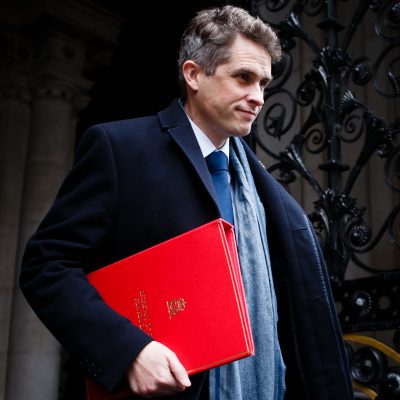The Department for Education is ditching its use of the “dated” word “expulsions” to describe permanent exclusions, after concerns were raised that it harked back to the era of corporal punishment.
However, the government will continue to refer to fixed-term exclusions as “suspensions”, despite worries that the word “trivialises” the action.
Ministers switched to using the terms to describe the two different types of exclusions in the wake of Edward Timpson’s landmark review in 2019, despite the fact the review did not recommend the language changes.
Education secretary Gavin Williamson used “expulsion” twice in his speech to the Confederation of School Trusts (CST) conference this month.

Williamson said the change in terminology was because “we need to make a differentiation between those children who are being suspended from school for a short period, as against those who are permanently excluded”.
Schools minister Nick Gibb has also used the phrase in answers to parliamentary questions.
Charities expressed ‘deep’ concern
But the Council for Disabled Children (CDC) told children’s minister Vicky Ford they were “deeply concerned” about the use of both “suspension” and “expulsions”.
In a letter, also signed by Ambitious About Autism and Special Educational Consortium, the CDC said: “The word ‘expulsion’ conveys a more vigorous, or even aggressively physical, approach to removing children from schools and, for some, the language provokes a visceral reaction.
“The language is dated and evokes an era that pre-dates the abolition of corporal punishment in schools.”
The letter also warned that it risked “undermining any constructive proposals” in the SEND review, due to report next month, and was “at odds” with prime minister Boris Johnson’s messages on “levelling up”. It continued that the term “suspension” seemed to “trivialise the action of exclusion and suggests that this is not really an exclusion”.
“Yet, we know…that a number of fixed-term exclusions can combine to have a detrimental impact on outcomes for disabled pupils.”
Ministers revert to ‘permanent exclusions’ but keep ‘suspension’
Children’s minister Vicky Ford said yesterday that the language was “not a change in policy”, but after listening to worries raised by the sector “the department has concluded it will reinstate ‘permanent exclusion’ when referring to a permanent exclusion while continuing to use ‘suspension’ when referring to fixed-term exclusion”.
In a letter sent to the charities, seen by Schools Week, she added: “I have made it a priority to protect and support children and young people with SEND throughout the pandemic and to put them at the heart of our wider recovery work.”

Writing for Schools Week, Philippa Stobbs, assistant director at CDC, said her organisation was “delighted” at the change. She added: “There are important messages here for recovery. These messages are all the more important for particular groups of pupils who are disproportionately excluded.
“The foundations are laid for a well-informed recovery. It will work better with less punitive language supporting it.”
It also marks a win for Timpson who last week told Schools Week he was “not keen” on using the word “expulsion”, as it sounded “too definitive, as if you are being removed from education all together”.
In response to the review in 2019, the government said it would “return to referring to fixed-term exclusion as ‘suspension’ and permanent exclusion as ‘expulsion’, to prevent confusion and conflation between the two terms”.
But Timpson said his review was not asked to look at language, and he was “surprised” to see the comment. His review only recommended renaming pupil referral units.








Terms are simply verbal air. However they mask the same question which remains unanswered. Allowing for circumstantial leeway, could we have a sample list of what children are excluded, isolated for?
could we have a sample list of what children are excluded, isolated for? safe behaviour’) during this COVID-19 pandemic or for putting their rucksack on their back before class has ended, etc, etc.
At no time has it ever, ever, ever been for anything of a more serious matter.
Instead of being ‘delighted’ for the change of ‘expulsion’ to ‘exclusion’ and ‘permanent exclusion’
its more fitting to do away entirely with isolation sanctions for student behaviours I mentioned. What should ideally happen is teacher a should be able to deal with their classroom of students. A teacher should be able to take charge right there and then; they should demand the respect of their students, instead of passively and arbitrarily sending a student off to the isolation room thus giving AWAY their power to have control of their class. It has been my observation that students who protest the heavy ‘isolation’ treatment for what can be described as ‘normal child behaviour’ end up being ‘excluded’ from school.
More schools than not, using ‘isolations’ and ‘exclusions’ as discipline for EVERY ‘infraction’ demonstrated by a primary and/or secondary school student are participating in and perpetuating child abuse and are therefore in contravention of the UN’s rights of the child and the schools are also (probably) committing a civil or criminal violation.
Perhaps the ‘powers that be’ would like to now argue on the semantics of the words ‘abuse’ and ‘school sanctions’.
Yes, could we please have a sample list of what children are excluded, isolated for? My grandchildren attend a school where the sanctions ‘isolations’ and ‘exclusions’ for every behaviour that is deemed to be ‘disruptive’. ‘Behaviour’ such as touching the wall in the corridor of the school with one’s hand (‘unsafe behaviour’) during this COVID-19 pandemic or for putting their rucksack on their back before class has ended, tying a shoelace, pulling a mask down to ‘catch my breath’ etc, etc. These actions led to isolation and then exclusion.
At no time has it ever, ever, ever been for anything of a more serious matter like REAL ‘disruptive behaviour’.
Instead of being ‘delighted’ for the change of ‘expulsion’ to ‘exclusion’ and ‘permanent exclusion’
its more fitting to do away entirely with isolation sanctions for student behaviours I mentioned. What should ideally happen is teacher a should be able to deal with their classroom of students. A teacher should be able to take charge right there and then; they should demand the respect of their students, instead of passively and arbitrarily sending a student off to the isolation room thus giving AWAY their power to have control of their class. It has been my observation that students who protest the heavy ‘isolation’ treatment for what can be described as ‘normal child behaviour’ end up being ‘excluded’ from school.
More schools than not, using ‘isolations’ and ‘exclusions’ as discipline for EVERY ‘infraction’ demonstrated by a primary and/or secondary school student are participating in and perpetuating child abuse and are therefore in contravention of the UN’s rights of the child and the schools are also (probably) committing a civil or criminal violation.
Perhaps the ‘powers that be’ would like to now argue on the semantics of the words ‘abuse’ and ‘school sanctions’.
Hi Chris
We already have that, they are:
Physical assault against a pupil
Physical assault against an adult
Verbal abuse/threatening behaviour against a pupil
Verbal abuse/threatening behaviour against an adult
Use or threat of use of an offensive weapon or prohibited item
Bullying
Racist abuse
Abuse against sexual orientation and gender identity
Abuse relating to disability
Sexual misconduct
Drug and alcohol related
Damage
Theft
Persistent or general disruptive behaviour
Inappropriate use of social media or online technology
Wilful and repeated transgression of protective measures in place to protect public health
This is another example of politically correct bull the person who needs to be fired why are we paying our taxes to give people like this a job
My son was suspended for allegedly throwing a paper aeroplane at a teacher I say allegedly as she did not see who it was but threatened the entire class with after school detention, no one owned up so because it came from his end if the class he was taken outside and told to own up he refused but was then then told three times over if he apologised for it no further action would be taken against anyone so he did and was then suspended the next day despite my appeal to the school on his behalf!